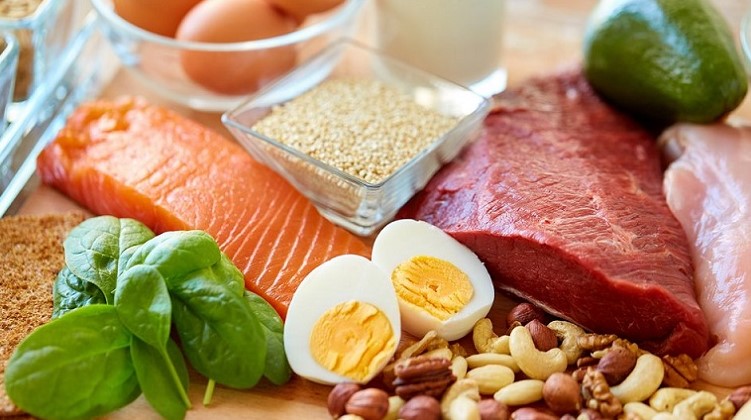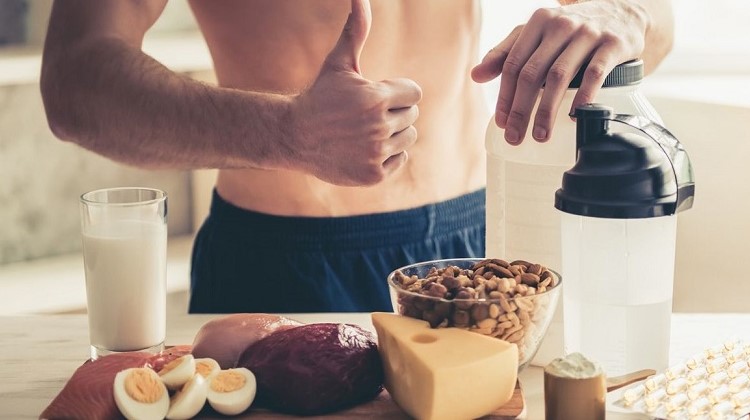To maintain good health, your body requires three macronutrients, namely; carbohydrates, fats, and protein. While every one of these macronutrients are important to healthy bodily functions; in this post, our primary focus will be on highlighting the importance of protein in the body.
It is worth mentioning at this point that protein plays a very significant role in the body as it consists of amino acids which are essentially the building blocks of skeletal muscle tissue.
For any self-respecting bodybuilder, understanding the protein importance for the body will be critical to helping you achieve your bodybuilding goals.
As a matter of fact, it is well known in both the medical and bodybuilding community that a diet containing high amounts of amino acids and dietary protein will help in boosting protein synthesis which then promotes skeletal muscle tissue growth.
Also, in the case of muscle-related injuries, the increased levels of protein synthesis brought about by amino acids can help to quicken recovery.
So, bodybuilders really shouldn’t view consuming the best protein for bodybuilding as an option, but rather they should see it as an absolute necessity for building muscle mass and aiding muscle recovery after high-interval intensity training (HIIT).
But before we get into how protein can help you as a bodybuilder, we’ll begin by going through the basics.
What is Dietary Protein?
Dietary protein is available in both animal and plant-based food sources. Foods like red meat from beef and white meat from fish, turkey and chicken are all rich in dietary protein serving up about four calories per gram.
Plant-based foods like lentils, quinoa, beans, and hummus are good sources of dietary protein, but they do not provide as much protein in comparison to animal-based food sources.
The main reason for this is because unlike animal food sources that provide the body with all 20 amino acids which make up dietary protein, plant food sources rarely contain the 20 amino acids to make a complete protein.
In order to get all 20 amino acids from plant food sources, you will need to consume a variety of plant foods like lentils and quinoa, vegetables and hummus or even beans and rice.
Essentially, your eating preferences really doesn’t matter as you need to consume a good amount of dietary protein on a daily basis if you want to be healthy and even more so, if you want to meet your bodybuilding goal of promoting lean skeletal muscle mass.

Protein Importance for the Body
The importance of protein to your body cannot be overemphasized. Protein influences every single bodily function in one way or another, directly and indirectly.
Here’s a rundown of some of the key functions of protein in the body.
Conveying Oxygen
Protein helps to convey oxygen to all parts of the body. This is particularly important to bodybuilders as a sufficient supply of oxygen to skeletal muscle tissues will enhance your energy, strength and stamina.
Tissue Building and Repair
Protein promotes the building of tissue and that includes skeletal muscle tissue. Protein also aids the quick repair and healing of damaged tissue which is particularly important to bodybuilders looking to recover from high-interval intensity training sessions.
Protection from Infection
Protein helps in protecting the body from being ravaged by infection as the body’s antibodies are made predominantly of amino acids.
Promotes Bodily Growth
Protein is the building block of human growth. Therefore cartilage, ligaments, tissue, organs, blood, skin, nails, and hair owe their growth, development and sustenance to protein.
Promotes the Production of Enzymes and Hormones
Protein is responsible for producing the body’s vital hormones and enzymes. For example, the enzyme which reads our DNA genetic code in order to produce brand new molecules are made from protein. In fact protein molecules help in transmitting signals throughout the body between organs, tissues, and cells.
How to Use the Best Protein for Bodybuilding plus Recommended Daily Intake Information
The amount of protein that the average Joe should consume on a daily basis cannot be compared to that of a dedicated bodybuilder. There have been several debates with regards to what the best protein for bodybuilding should be with government agencies setting various standards based on their research.
For example the recommended dietary allowance or RDA set by the government of the U.S for everyone is around 0.36 grams per Lb bodyweight while the American College of Sports Medicine, the Academy of Nutrition and Dietetics, and the Dietitians of Canada recommend a 1 gram per Lb bodyweight daily intake for athletes.
But the International Society of Sports Nutrition has recommended a daily protein consumption of 1.4 to 2.0 grams per Lb bodyweight for active people including bodybuilders and athletes.
If you are a bodybuilder, it is advisable to consume as much protein as possible. High-interval intensity training can put a tremendous amount of strain on the skeletal muscles and the consumption of dietary protein in addition to the use of supplements will go a long way in promoting the repair of damaged muscle tissue while also promoting muscle building.
To this end, active bodybuilders should aim to consume as much as 2.0 grams per Lb bodyweight of dietary protein on a day to day basis. So if for example your bodyweight is 200 Ib, you need to consume as much as 400 grams of protein daily.
However, you will need to spread out your consumption of 400 grams of protein at different meals throughout the day rather than consuming this amount all in one meal.

Dietary Protein Results for Bodybuilding
Protein offers bodybuilders loads of bodybuilding benefits, some of which have already been mentioned early on in this post. However, here’s a more detailed look at the benefits and results you can expect when you maintain a recommended daily consumption rate for protein that is ideal for your bodybuilding needs.
Skeletal Muscle Mass
Your protein consumption at the right RDA will promote the increased production of growth hormone and protein synthesis in your skeletal muscles leading to sustained skeletal muscle mass building.
Muscle Tissue Repair and Recovery
As you workout your muscle tissue will break down, but it will need to be repaired quickly if you want to continue with your training schedule. This is where dietary protein comes in. Protein will promote protein synthesis in damaged muscle tissue to aid quick repair and recovery.
Preventing Muscle Breakdown
Consuming the right amount of dietary protein and supporting your consumption with protein supplements will prevent catabolic effects from taking place which breaks down your skeletal muscles during training using your muscle gains as energy fuel. Dietary protein will protect you from losing your muscle gains in training and even during off-season.

Final Thoughts
Without a doubt, dietary protein is an absolute necessity for everyone let alone bodybuilders. Protein helps in preventing muscle breakdown while promoting growth and speedy recovery.
It is important to consume sufficient amounts of protein daily and this should be in the form of both food sources (animal and plant) and dietary supplements.
A daily protein intake of 2.0 grams per Lb bodyweight is recommended for active bodybuilders and you can chat with a dietician to know the type of protein meals that would be best suited to your workout demands.
If you want to get started with a workout and nutrition plan that works for you, you can do so now by reaching out here for free coaching today.


